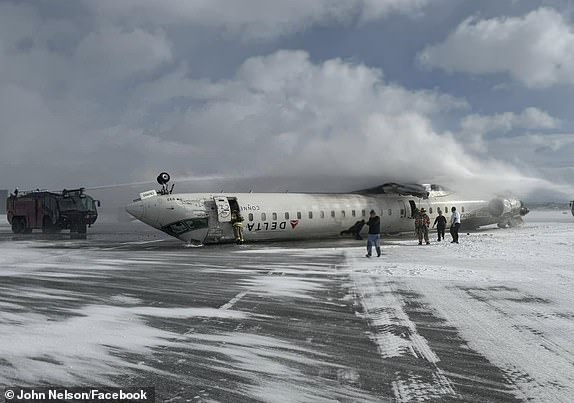Trauma and Post-Accident Anxiety
Toronto, Canada – The recent Delta Airlines plane crash at Toronto Pearson International Airport not only caused physical damage but also significant psychological repercussions for the passengers on board and those who suffer from a fear of flying. Although all 80 passengers and crew members survived, the emotional consequences can be long-lasting and debilitating.
Experiencing such a traumatic event can trigger intense emotional reactions, including acute stress, anxiety, and, in some cases, Post-Traumatic Stress Disorder (PTSD). Passengers involved may suffer from nightmares, flashbacks, and an intense fear of flying again.
Dr. Emily Carter, a clinical psychologist specializing in trauma recovery, explains: “Survivors of plane crashes often experience symptoms similar to PTSD. The brain replays the event as a survival mechanism, making it difficult for them to return to normal activities, especially flying.”
A study from the National Institute of Mental Health (NIMH) supports this, stating that “trauma exposure, particularly in high-stress environments like aviation accidents, significantly increases the likelihood of developing long-term anxiety disorders.” Many survivors struggle with an ongoing sense of vulnerability, which can affect their confidence in air travel and other aspects of daily life.
Mental health experts highlight that such events can lead to hypervigilance, panic, and depressive symptoms, requiring psychological support for proper recovery. For many, the memory of the accident remains vivid, affecting their ability to travel by air in the future.
Fear of Flying: An Exacerbated Phobia
Those who already struggle with aviophobia (fear of flying) may find their condition worsened by events like this. Even individuals who previously had no significant fear may develop an aversion to flying after a traumatic incident. The fear of losing control, uncertainty, and vulnerability are common feelings after a plane crash, reinforcing irrational beliefs about the dangers of aviation.
According to aviation psychologist Dr. Mark Levinson, “Fear of flying is largely driven by a lack of perceived control. When passengers experience a crash, their worst fears are confirmed, making it exponentially harder to step onto a plane again.” He adds that structured exposure therapy has proven effective in helping patients gradually regain confidence in flying.
A report from the International Air Transport Association (IATA) notes that “education on aviation safety, exposure therapy, and cognitive restructuring techniques can significantly help individuals manage and overcome their fear of flying.” Psychological resilience-building and professional support play crucial roles in recovery.
The Role of Airlines in Psychological Support
Given the emotional impact of the accident, Delta Airlines and airport authorities have emphasized the importance of providing psychological support to the victims. Emotional support teams have been made available to assist passengers and crew members in need of counseling.
An official statement from Delta Airlines reads: “We understand the emotional toll this incident has taken on our passengers. Delta is committed to supporting everyone affected by providing access to trauma specialists and counseling resources.” Airlines are also investing in specialized training for flight attendants and ground staff to better assist anxious passengers before, during, and after flights.
The aviation industry, aware of the emotional challenges following a crash, has been investing in psychological assistance programs for its passengers, along with continuous safety improvements to prevent future incidents. Many airlines offer programs aimed at educating travelers on aircraft safety and flight mechanics to help alleviate fears associated with air travel.
Global news also wrote an interesting news about it check out here: Despite 4 plane crashes in 3 weeks, flying is safe. Here’s why
Conclusion
While the Delta Airlines crash in Toronto resulted in no fatalities, the psychological scars on passengers may last a long time. Immediate psychological support, awareness of emotional impact, and the development of effective coping strategies are essential to ensuring that those affected can regain trust in air travel safety and move forward.
Continuous support, industry-wide mental health initiatives, and preventive measures will help minimize the impact of such events, enabling passengers and crew members to face their fears and overcome the emotional difficulties resulting from their experience.
Here are some resources for people seeking help with anxiety, fear of flying, and trauma recovery:
Don’t worry. You are not alone!
General Anxiety & Mental Health Support
- Anxiety & Depression Association of America (ADAA) – Provides resources, self-help tools, and therapist directories.
🔗 https://adaa.org - National Alliance on Mental Illness (NAMI) – Offers support groups, helplines, and educational content on mental health.
🔗 https://nami.org
📞 Helpline: 1-800-950-NAMI (6264) - Mental Health America (MHA) – Provides online screening tools and mental health resources.
🔗 https://www.mhanational.org - BetterHelp – Online therapy platform that connects individuals with licensed therapists.
🔗 https://www.betterhelp.com - Headspace – Meditation and mindfulness app to help manage stress and anxiety.
🔗 https://www.headspace.com
Fear of Flying & Aviation Anxiety Support
- SOAR Fear of Flying Program – Led by a former airline captain and psychologist, providing courses and personal coaching.
🔗 https://www.fearofflying.com - Fear of Flying Clinic (Fly Calm Program by IATA) – Offers education, exposure therapy, and psychological support.
🔗 https://www.iata.org/en/training/pages/fly-calm - Turbulence Forecast – A resource for understanding turbulence patterns and preparing nervous flyers.
🔗 https://www.turbulenceforecast.com - VALK Foundation – A research-backed program developed in collaboration with airlines and universities to treat fear of flying.
🔗 https://www.valk.org
Trauma & PTSD Recovery
- The International Society for Traumatic Stress Studies (ISTSS) – Provides research-based support for PTSD and trauma.
🔗 https://www.istss.org - Sidran Institute – Resources for trauma survivors, including PTSD treatment providers.
🔗 https://www.sidran.org - Veterans Crisis Line (for military personnel and veterans dealing with PTSD)
🔗 https://www.veteranscrisisline.net
📞 Helpline: 1-800-273-8255 (Press 1)
Helplines for Immediate Support
- Crisis Text Line – Free 24/7 support via text message.
📱 Text HOME to 741741
🔗 https://www.crisistextline.org - Samaritans (UK) – Free confidential support for those in distress.
📞 Call 116 123
🔗 https://www.samaritans.org - Lifeline Canada – Mental health crisis and suicide prevention support.
📞 Call 988 (Canada-wide suicide prevention hotline)
🔗 https://988.ca
These resources provide different levels of support, from self-help tools to professional therapy.

